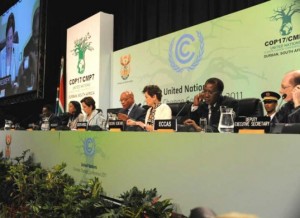Dickinson to Durban » Climate Change, Environmental Politics, Key COP17 Issues, Mosaic Action » Oh the US
Oh the US
By: Anna McGinn ’14
 As expected, it seems that countries are already dividing on key issues. US negotiators confirm that the United States will continue to stay away from Kyoto. Canada has also stated that they will not sign on to a second commitment period. While these countries are trying to leave Kyoto behind, most of the delegates and NGO representative I have talked to from low emitting countries, least developed countries (LDCs), and the most vulnerable countries say that it is absolutely imperative that a second commitment period to Kyoto is agreed upon. A representative from WWF Madagascar stressed the importance of a second commitment period throughout our discussion. It seems unlikely that something binding will be agreed upon at this point, but it is still early in the negotiations.
As expected, it seems that countries are already dividing on key issues. US negotiators confirm that the United States will continue to stay away from Kyoto. Canada has also stated that they will not sign on to a second commitment period. While these countries are trying to leave Kyoto behind, most of the delegates and NGO representative I have talked to from low emitting countries, least developed countries (LDCs), and the most vulnerable countries say that it is absolutely imperative that a second commitment period to Kyoto is agreed upon. A representative from WWF Madagascar stressed the importance of a second commitment period throughout our discussion. It seems unlikely that something binding will be agreed upon at this point, but it is still early in the negotiations.
Delving into these positions a bit further, I have found explanations of the United States position on Kyoto as well as most topics in the negotiations from both United States representatives and other countries’ delegates very interesting. Earlier this morning, I talked with Saleem Huq of Bangladesh. During our discussion, he explained how everyone watches US domestic politics and most people at this conference know more about US politics than the average US citizen. He went on to say that the US does not have much of a role right now because they cannot move forward with any policies domestically. Obviously it is quite a problem that the US cannot play a large role in the negotiations because we are causing the majority of the problem.
Last night, I rode the bus with a mayor from Nigeria who touched on how problematic it is that the US is not playing a larger role. He directly said to me that my country (US) is causing the problem and that solutions need to come from within. The people of the US need to solve the problem. Again, it came up that US domestic politics need to transcend their party boundaries and see other countries’ points of view. I welcomed this conversation because it is refreshing to hear other delegations’ opinions of the US in an open manner.
Yesterday we also attended a briefing with Jonathan Pershing, the lead negotiator for the US. He explained the current state of the negotiations and also discussed the role of the US. Again, the divided congress was highlighted as the reason the US negotiators cannot commit to more action.
It is clear in US domestic news every day that very little has been achieved in the US legislative branch currently and in the recent past. We learned throughout the semester that as a result of this the US will not be able to commit to anything substantial at the COP. These people’s opinions reaffirm the issues this stalemate causes and shows the degree to which it affects everyone in the world. To see real change come out of these conferences, it is essential that political realities in the US change. It is important that countries move on without the US in negotiations, but the US must join because they are such large emitters. I am pessimistic that this will happen in the near future, but it is what needs to happen to address the issue of climate change globally.
Filed under: Climate Change, Environmental Politics, Key COP17 Issues, Mosaic Action · Tags: Anna McGinn, Jonathon pershing, Kyoto, madagascar, nigeria








Awesome relative overview of what’s going on here in Durban. It is true that the US is making negotiations difficult because we are unable to move forward due to the state of the nation at home. This became clear during both our talk with Saleemul and the briefing with Pershing. Saleemul also said, however, that some nations are trying to come up with a solution/agreement here at Durban that doesn’t include the US (namely the EU). I wonder if this is possible. He said that the EU would have to get China on their side if they wanted to make any kind of progress without the US. If they succeed in this an agreement may be put in place without US involvement but the US would still have to agree to it. Maybe if they just sit tight and leave everyone else alone something can come out of Durban regardless of our nation’s stubborness.